September 13, 2016
The Set-up
For four years I’ve been investigating a publicly supported non-profit homeless group in Seattle called SHARE. SHARE runs 14 indoor shelters around Seattle, for which it annually gets several hundred thousand dollars from Seattle’s Human Services Department. Most of these shelters are owned by churches. Besides the shelters, SHARE operates a network of homeless camps known as “tent cities.” The group says that “up to 450 people each night find safety, shelter, dignity, and respect” its “self-managed” shelters and camps, but it has never provided any documentation for that figure. The group resists attempts to monitor its numbers or performance as an “invasion of privacy.” SHARE views homelessness as a valid lifestyle – a lifestyle of choice – and while it does get a number of people off the street temporarily, it makes no claim of getting them into jobs, permanent housing, or addiction treatment programs. “We are not a social service organization,” they declare. “We are a self-help group.”
Together, SHARE and WHEEL educate our community about the causes and effects of homelessness, build bridges with homed people to address those issues, and actively lobby to change policies that oppress homeless people.–from the About Us page on SHARE’s Web site (9/10/16)
If you visit a SHARE tent camp or shelter you will meet people who have been homeless for years. As a rule, these people do not have caseworkers, and many/most have no definite plan for transitioning into an apartment. When they leave one tent camp or shelter, they simply find another. Or they go back to the streets. Or they move to another state. You might ask how an organization that has nothing to do with 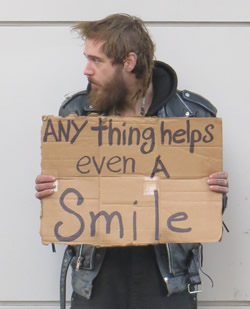 getting people into housing, could bite out such a big chunk of the city’s housing budget each year. How could it enjoy the continuing patronage of a government that’s trying to end homelessness? There seems to be a contradiction there, but it goes away when you understand that politics is the art not of doing but of seeming. And SHARE gives local politicians an easy way to seem to be doing something about homelessness, even as the problem worsens. SHARE is to the government as the corner panhandler is to the average citizen. Deep down, we know that handing the guy a buck won’t make a difference in his life. But that doesn’t matter, because it still makes in a difference in ours.
getting people into housing, could bite out such a big chunk of the city’s housing budget each year. How could it enjoy the continuing patronage of a government that’s trying to end homelessness? There seems to be a contradiction there, but it goes away when you understand that politics is the art not of doing but of seeming. And SHARE gives local politicians an easy way to seem to be doing something about homelessness, even as the problem worsens. SHARE is to the government as the corner panhandler is to the average citizen. Deep down, we know that handing the guy a buck won’t make a difference in his life. But that doesn’t matter, because it still makes in a difference in ours.
SHARE’s in the local news a lot, and though the coverage often mentions problems with the tent camps or complaints against SHARE or its director, Scott Morrow, that story usually gets submerged in the larger story of homelessness and what a crisis it is for the city. By contrast, I have chosen to spotlight SHARE and Morrow in my coverage. Originally, my purpose was not just to edify my readers but to pressure the government to take action. When I began this project I reckoned that I needed only to pinpoint a few abuses or likely crimes, drop a few documents off at City Hall, and my task would be done. Looking back, I have to smile at my naivete and frustration. But in the end, I’m glad things didn’t turn out that easy, for if they had, then I would’ve missed a much bigger story.
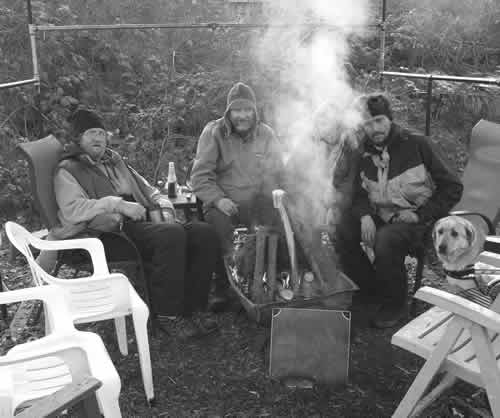
Homeless men relax at SHARE’s Nickelsville camp in 2011. SHARE doesn’t claim to be helping people find housing. Rather, it’s freeing them from “oppression.” [Photo by Kevin McClintic]
My research culminated in a purely accidental discovery that SHARE had been using a fraudulent, unlicensed accountant for years, which meant that the financials SHARE had been filing with the city during those years – financials that were a mess in the first place – would now, finally, be subject to a honest review. But it was not to be. The City Attorney was tasked with following up on this, but unfortunately he has followed the familiar pattern, not only refusing to enforce the law against SHARE, but refusing to explain why he won’t enforce it.
So now it is left to me to tell the story as I understand it. Many of the charges I level against SHARE will seem extreme. And indeed, these are serious crimes I’m talking about. Embezzlement, fraud, tax evasion . . . Yet I feel well justified in making these charges. SHARE is, after all, a publicly funded non-profit group. A 501(c)3. As such, its financial records should be open for all to see. But they are not open. And what little we can see of them is troubling indeed. I’ve given SHARE many chances to explain their accounts and they have not even bothered to answer my e-mails and letters. They have therefore placed themselves at the mercy of interpretation.
Follow the Money
Many homeless people have told me about unsavory things they’ve seen SHARE staffers doing, but for a variety of reasons, these people don’t make good witnesses. A safer course for me is to build the case using official documents such as tax forms and contracts, which I will rely on heavily. I will use one of SHARE’s tax returns, their 2012 IRS 990 form, as my starting point. Though SHARE’s 990s are similar from one year to the next, I chose 2o12 for several reasons. 2012 was just four years ago, and this was one of the returns filed by the bogus accountant. Most of the board members listed on the 2012 return are still with the organization and two of the principals, Michelle Marchand and Anitra Freeman, are still in the same position now as they were then. Of the returns I looked at, 2012 has the greatest number of questionable items on it. Finally, 2012 is a likely year because it coincides with Human Services contracts whereby SHARE agreed to provide certain services that that they never did provide.

From SHARE’s 2012 IRS 990, Schedule O: The Board of Directors of SHARE make it clear for anyone visiting their location that all required information relative to the operation of the organization are [sic] available upon request. This includes tax returns, statements of conflicts of interest, governing documents, financial statements, etc. [Click to enlarge]
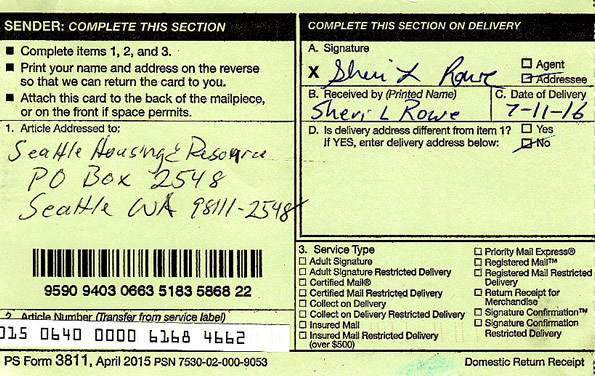 SHARE claims to welcome inquiries from the public about their finances, so on July 5, 2016, I sent their contact person, Michelle Marchand, a list of questions regarding SHARE’s 2012 return. I asked her to set a time to meet with me at the SHARE office to discuss them. The letter was received on July 11, 2016 and signed for by SHARE staffer Sheri Rowe. But no one from SHARE ever responded to my letter.
SHARE claims to welcome inquiries from the public about their finances, so on July 5, 2016, I sent their contact person, Michelle Marchand, a list of questions regarding SHARE’s 2012 return. I asked her to set a time to meet with me at the SHARE office to discuss them. The letter was received on July 11, 2016 and signed for by SHARE staffer Sheri Rowe. But no one from SHARE ever responded to my letter.
Here’s my letter, in full:
SHARE_Financial_Query_July_5_2016
For reference, you can see SHARE’s complete 2012 IRS 990 tax form.
I will now go through the letter item by item and explain why the various issues I raised are problematic. If SHARE wishes to respond to any of these items now, they may do so at any time. I will publish their responses.
Item: SHARE doesn’t give the public an account of grant money received
Referring to Form 990, Part I, Line 20, I asked Ms. Marchand to provide me with a breakdown of the $106,000 in grant money SHARE received and paid in 2012. She did not respond.
Why this is a problem . . .
By refusing to make their records public, SHARE does not give the public any way to know how much money they’re getting from private grants or where that money is going. This means we can’t compare separate items of income with expenditures and can’t determine whether SHARE is using the grant money they’re given for the purposes intended or whether they’re pilfering it. There is cause for concern here, since I have been told by a former SHARE grant writer that grant money is routinely misspent or diverted. This same grant writer told me he’d written an application for a $60,000 grant with the Satterberg Foundation. The money was to be used to build a “computer infrastructure” in SHARE’s homeless camps and shelters. The grant was awarded, but no computer infrastructure was ever built, he told me. So where did that money go?
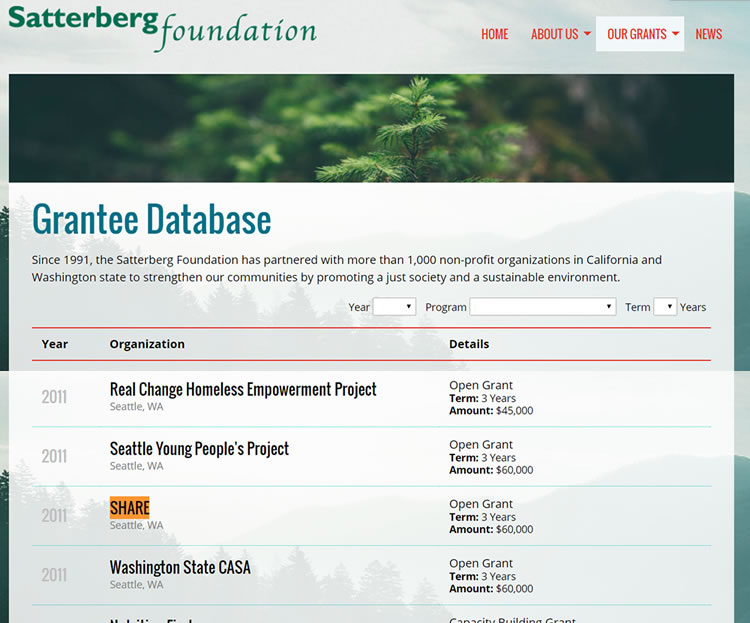
This screenshot from the Satterberg Web site shows a $60,000 grant to SHARE in 2011. Where did the money go? SHARE’s not talking . . .
Item: SHARE does extensive lobbying but does not admit it on Form 990.
On Part IV, Line 4 of the 990 form, the IRS asks, Did you engage in lobbying activities? –SHARE’s answer is “no.” Which is odd because, if you’ll recall from the group’s mission statement above, they proclaim that one of the chief goals is to “actively lobby to change policies that oppress homeless people.” And SHARE is as good as their word. They do lobby, both publicly and privately. They lobby both for money and for laws that are favorable to them. Tent camp ordinances passed at the city, county, and state level ALL bear the mark of SHARE’s influence. SHARE regularly rounds up its members to speak to the Seattle and King County Councils in order to ask for more money for SHARE and to get legislation crafted specifically for the benefit of the group. This article from the Seattle Times describes how, on March 16 of this year, SHARE closed its indoor men’s shelters in Seattle and directed the residents to pitch a “protest camp” at the King County administration building in downtown Seattle. The purpose of this protest was to lobby King County for more money. On September 4, nearly six months after the protest began, I took these pictures:
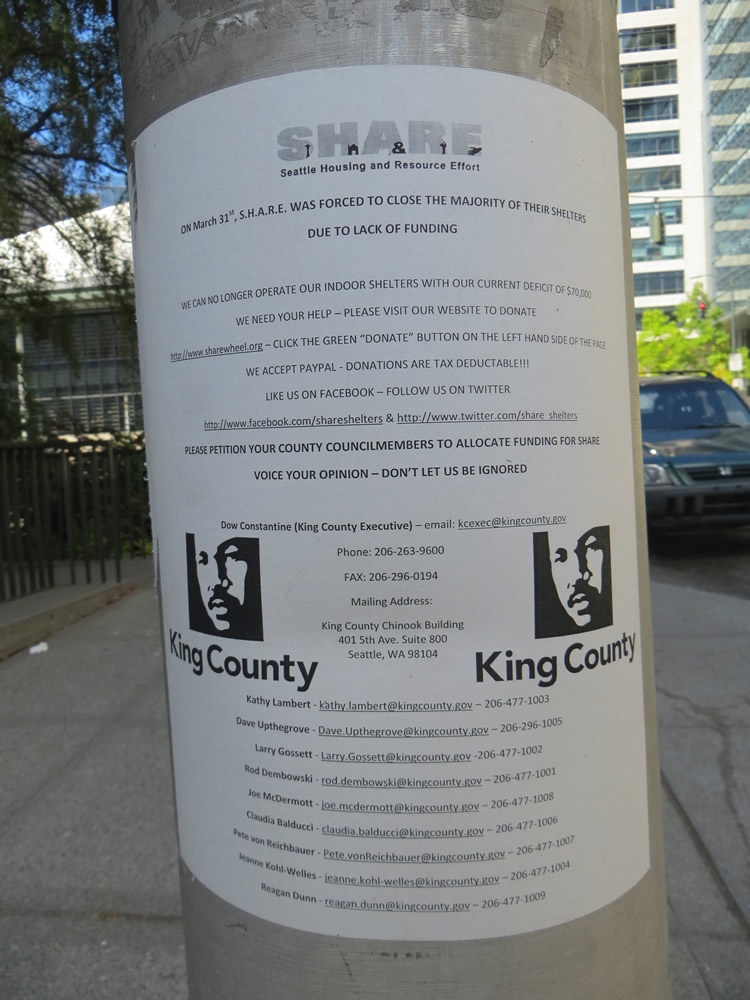
A flyer pasted on a utility pole outside the King County Courthouse directs citizens to contact local officials and pressure them to approve more money for SHARE. [Photos by David Preston ~ Click to enlarge]
SHARE claims on their 990 that they don’t do lobbying. But if this isn’t lobbying – what is?
Why truthfulness about SHARE’s lobbying is important . . .
The reason the IRS asks this question is because any group that is “substantially” about lobbying or fundraising should not be getting tax-exempt status. According to the tax code:
In general, no organization may qualify for section 501(c)(3) status if a substantial part of its activities is attempting to influence legislation (commonly known as lobbying). A 501(c)(3) organization may engage in some lobbying, but too much lobbying activity risks loss of tax-exempt status.
The question here is not whether SHARE does any lobbying but whether it does substantial lobbying. Which it clearly does. If SHARE had given an honest “yes” to the question, it wouldn’t have automatically disqualified them from tax-exempt status. But it would have required that they follow through and also fill out Schedule C, Part II, so the IRS could evaluate the situation further. SHARE answered no so they would not have to fill out Schedule C, Part II and take the risk of triggering a closer look by the IRS.
Item: SHARE owns land, buildings and other assets but doesn’t include them on its 990 form as required
SHARE checked no on Part IV, Line 11(a), even though they should have checked yes, since, in the section the checkbox refers to, they had entered an amount for land and buildings owned by them. The reason SHARE checked no on this box was likely so they would not have to attach Schedule D, where they would have to give an itemized account of land they owned. Although SHARE could plausibly claim they were confused by this, it is more likely that the intent was to deceive.
SHARE similarly checked “no” on Part IV, Line 11(e), stating that they had not entered an amount on Part X, Line 25, even though they had entered something there. The reason is likely the same as above: so they would not have to attach Schedule D.
Item: SHARE conceals and misstates the amount of non-cash contributions it receives.
On Part IV, Line 29, SHARE answers “no” to the question: “Did you receive more than $25,000 in non-cash contributions?”
That is deceptive on two counts. First, SHARE’s homeless camps do get direct, non-cash contributions of over $25,000 per year. These come in the form of donor drop-offs at their camps. Second, each year SHARE solicits additional tens of thousands of dollars in non-cash contributions for the purpose of selling them at an auction. Either set of donations would, by itself, total well over $25K for any given year. Even if there were no donations at the camps, though, the auction items alone would put SHARE over the $25K threshold, if they were reported honestly.
Donations at the Camps
SHARE takes donation drop-offs at all five homeless camps it operates, and at each of these camps, monthly donations are worth several thousand dollars, according to what one “donations coordinator” told me. Here’s a list of items that SHARE was soliciting at its encampment in West Seattle in 2012:
Items donated include batteries, camping equipment, power equipment (e.g., generators, compressors), building supplies, electronic goods, clothing, prepared food, canned food, medicine, dog food, firewood, kerosene, bus tickets, toiletries, and gift cards.
In 2007, Seattle news personality Ken Schram donated an RV to the group. The RV was kept off the books and later vanished. When this was discovered, Schram shrugged it off, saying he’d given the donation freely and wasn’t going to hold anyone to account for it.
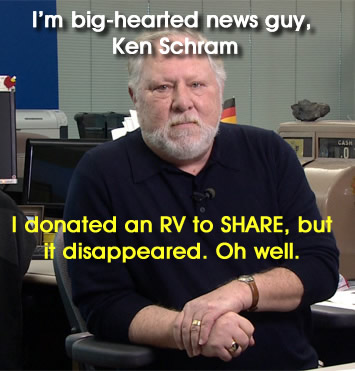 SHARE could plausibly claim that the smaller donations are passed directly to homeless people, but that’s only half true. When donations come into the camp, they aren’t just doled out immediately to whoever wants them. Rather, they are inventoried by the “donations coordinator” to determine which ones should stay in the camps for daily use and which could be sent to another camp, used in SHARE’s office, or sold. According to what several campers have told me, the high-value items often just disappear, like Mr. Schram’s RV, and are never seen again.
SHARE could plausibly claim that the smaller donations are passed directly to homeless people, but that’s only half true. When donations come into the camp, they aren’t just doled out immediately to whoever wants them. Rather, they are inventoried by the “donations coordinator” to determine which ones should stay in the camps for daily use and which could be sent to another camp, used in SHARE’s office, or sold. According to what several campers have told me, the high-value items often just disappear, like Mr. Schram’s RV, and are never seen again.
Perhaps the most valuable single-item gifts to SHARE are the many “tiny houses” that are donated to it each year by local schools and businesses. You can see a sample of these houses in the picture below, which I took outside the Nickelsville homeless camp in September, 2015.

If we factor in materials, labor, and delivery, we can conservatively estimate the value of one of these tiny houses at $2,000. (Some deluxe models are worth much more.) SHARE receives several of these houses per year. The houses aren’t being sold on the black market; I mention them because if their value were put on the books together with all the other non-cash donations, it would easily put SHARE over the $25,000 non-cash donation itemizing limit. In any case, since SHARE won’t provide records on their non-cash contributions, it’s impossible to tell how many of these contributions are being pilfered.
Nickelsville: A Legal Fiction
Nickelsville is the name of a series of homeless camps run by SHARE over the years. SHARE spokespeople are quick to say that SHARE should not be confused with Nickelsville, which is its own 501(c)3. But while the two entities are technically separate, they are functionally the same. Nickelsville was created around 2007 as a way for SHARE to beat the terms of a 10-year consent decree it had signed with Seattle in 2001. This decree limited SHARE to one tent camp within the city limits. By spinning off a separate rogue organization (Nickelsville), SHARE was able to launch additional tent camps inside the city without breaking the letter of the decree. In 2015 Nickelsville was formally incorporated by SHARE director Scott Morrow’s lieutenant Peggy Hotes, but Nickelsville’s assets, staff, and activities are co-mingled, and Nickelsville, like SHARE, is controlled by the same small group of people. The creation of Nickelsville is deceptive to say the least. It is probably also illegal under federal tax law.
The Fall Harvest Auction
In addition to the goods donated at its camps, every year SHARE collects hundreds of additional donations from its shelter and tent camp clients. Starting in mid-summer, shelter and tent camp residents are told that they either have to come up with some cash or collect “donations” from local businesses and hand those over to SHARE in order to keep using the shelter facilities. If they don’t get the swag or buy their way out, campers can be evicted, and I have internal SHARE records of several campers who were tossed out of a camp for not making their quota. Odd as it sounds – this idea of forcing homeless people to donate money or goods for an auction – government officials have long known about the practice and winked at it.
Here’s a SHARE document summarizing donation requirements. It’s by Scott Morrow’s lieutenant Peggy Hotes, who runs the auction and manages money for SHARE.
Here’s the current Facebook page for the Harvest Auction.
Donations are auctioned off at SHARE’s annual Fall Harvest Auction in September, where items typically bring in an amount larger than the nominal value of the donation. The total proceeds of the auction for 2012 are shown on Part VIII, Line 8(c) as $48,328, which is listed as net income from fundraising.

Booze basket for the 2016 Fall Harvest Auction. How many were donated? How much did they go for? No one outside of SHARE will ever know.
Auctioning donations makes sense, because their value can be magnified. However, the auction also allows SHARE to roll a large number of non-cash contributions – contributions that would otherwise be above to the IRS itemization threshold – into one big wad of cash that SHARE does not have to itemize.
Why fudging on non-cash donations is a problem . . .
Non-cash donations are a hot-spot for theft from non-profits. Blue Avocado, a trade magazine for the non-profit industry, puts non-cash assets on the top of its list of valuables most commonly stolen from non-profits by employees. Disaffected SHARE insiders have reported that staff are taking donated gift cards and other easy-to-move items and selling them on Craigslist. Such sales are nearly impossible to track back to SHARE, since they are in cash and are for relatively small amounts. This form of embezzlement is known as skimming. Charities that get much of their assets in the form of small, non-cash donations are especially subject to skimming, and this is precisely why the IRS 990 form triggers a closer look if annual non-cash contributions go above $25,000. Using the Fall Harvest Auction to convert donations into cash might be legitimate, since auctioning magnifies the value of donations. But since SHARE refuses to provide an itemized list of the auctioned goods, or the value received for each, we may reasonably infer that they’re skimming.
Items: Unexplained accounting expenses. Using an unlicensed “accountant.” No new accountant hired.
In my query to Ms. Marchand, I asked about Part IX, Line 11(c). The item is listed at $15,661, which was presumably paid to someone for preparing SHARE’s books and doing their taxes. But as I discovered last May, the man who SHARE claims was working as their accountant in 2012, one Steven A. Isaacson, is not a CPA. Moreover, there is little evidence that Mr. Isaacson – license or no license – actually did any accounting work for SHARE. All SHARE has to show for the eight years Isaacson is supposed to have worked for them is a couple of signatures on tax forms and two or three boilerplate cover letters signed by Isaacson attesting that had had reviewed (but not audited) SHARE’s books. These papers could have been prepared by anyone with a pocket calculator and a command of English. As we can see from the most cursory analysis of SHARE’s 2012 tax form, several items appear to have been botched: a no was entered where there should’ve been a yes, for example, a schedule that should have been attached is missing . . . And for this, SHARE paid someone $15,661? It doesn’t add up. That’s why I asked Ms. Marchand to show me some evidence that SHARE had actually spent that money on an accountant and what services the payment covered exactly. If SHARE paid the money to a different accountant, someone other than Mr. Isaacson, that would be helpful to know as well. But here again, Ms. Marchand declined to answer.
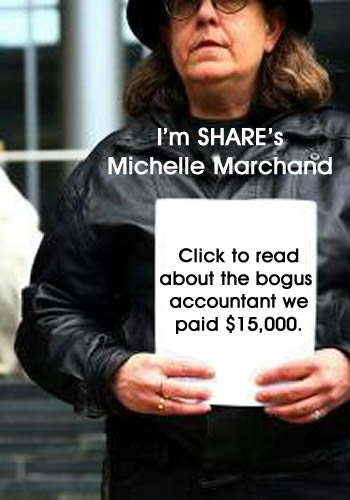 In a Web post dated May 17, 2016, SHARE committed to hiring a real CPA and fixing the damage they claimed Mr. Isaacson had done to them. Taking them at their word, Seattle City Attorney Pete Holmes, who had been alerted to the matter by this time, sent Marchand a letter on June 16, telling her that SHARE would not only need to retain a CPA, it would also need to do a thorough review of reports it had already submitted to the City. Mr. Holmes offered some helpful tips on where SHARE might be able to get a volunteer CPA. (Holmes’ letter is below.)
In a Web post dated May 17, 2016, SHARE committed to hiring a real CPA and fixing the damage they claimed Mr. Isaacson had done to them. Taking them at their word, Seattle City Attorney Pete Holmes, who had been alerted to the matter by this time, sent Marchand a letter on June 16, telling her that SHARE would not only need to retain a CPA, it would also need to do a thorough review of reports it had already submitted to the City. Mr. Holmes offered some helpful tips on where SHARE might be able to get a volunteer CPA. (Holmes’ letter is below.)
In my July 5 letter to Marchand, I asked her if SHARE had found a new CPA yet and if so, who that was. She did respond. It is now late August, over three months after I first broke the fake accountant story. SHARE still has no accountant, and their books have still not been reviewed by a licensed CPA.
Why is it important for SHARE to answer questions about their accountant?
SHARE claims that it was a victim in the Isaacson case. If we take that at face value, we would expect the group to be open and honest about what Isaacson did for them and how much they paid him for it. But their refusal to respond to my query casts doubt on their “we’re the victim” story. Consider these curious facts:
Fact: Mr. Isaacson has not been a licensed CPA for 32 years. At the time he was working for SHARE, he didn’t have an office, a business license, or even a listing in the local phone book. There is no record of him doing accounting work for anyone besides SHARE.
Conclusion: Isaacson was sought out by SHARE. Not as an actual accountant but rather as someone who could credibly pose as one. He might be good for a letter or two, and he could talk enough accountant lingo to be convincing. And that was all he was needed for.
Fact: Isaacson has been impoverished and living on the edge for decades, with several creditor judgments entered against him in local courts.
Conclusion: Isaacson needed the money. This was his motivation to go along with SHARE’s scheme.
A licensed and experienced accountant in Redmond told me that he’d contacted SHARE offering them his services free of charge after he read the story about Isaacson. SHARE didn’t follow up with him, and hasn’t retained anyone else either. And the reason is obvious: They don’t want an honest accountant looking over their books.
SHARE has been filing fraudulent financials for years and using Isaacson as a cover. Now that their cover’s been blown, they don’t want Isaacson talking to anyone else, and they don’t want to talk to anyone else about him. I doubt that Isaacson ever got anywhere near SHARE’s books. He was probably paid to put his signature on a few letters and the 990 forms – if he even did that. In any event, SHARE did not pay him any $15,000 for his “services.” If a check was written to him, part of that would’ve been kicked right back to SHARE. That’s the inference I make, based on the facts above and SHARE’s refusal to discuss the letter. If SHARE denies it, let them prove me wrong.
Item: Several large, unsupported expenses on SHARE’s 990
Three other items I highlighted in my query letter to Ms. Marchand are Travel (Part IX, Line 17), Utilities, and the “Tree of Life Wall” (Part IX, Line 24(b) / Statement 3). The amounts are $42,314, $143,610, and $134,931, respectively.
Utilities: The utilities figure could be realistic, but $143,610 seems like a lot to pay, just to keep the lights on at a handful of indoor shelters. Also included in that figure are port-a-pottie service and trash pick-up at outdoor homeless camps, but those expenses are often covered up by host churches or the local municipality, and I would like to see how the expenses break out for a typical year. Since SHARE is not releasing that information, it’s impossible to know whether they’re fudging or not.
Travel: The amount listed is a whopping $43,000. For one year. For a homeless services organization that claims to have a handful of paid employees. (SHARE didn’t report the number of employees they had, but they did report the total salaries, in Part 1, Line 15, which were less than $250,000, which is not a lot of employees.) Even if the travel figure is honest, you have to question SHARE’s judgment in authorizing this kind of spending. SHARE claims to provide Seattle with shelter beds at the rate of around $7 per night, so how many extra shelter bed nights could have been supplied with that $43,000? (Answer: 6,142)
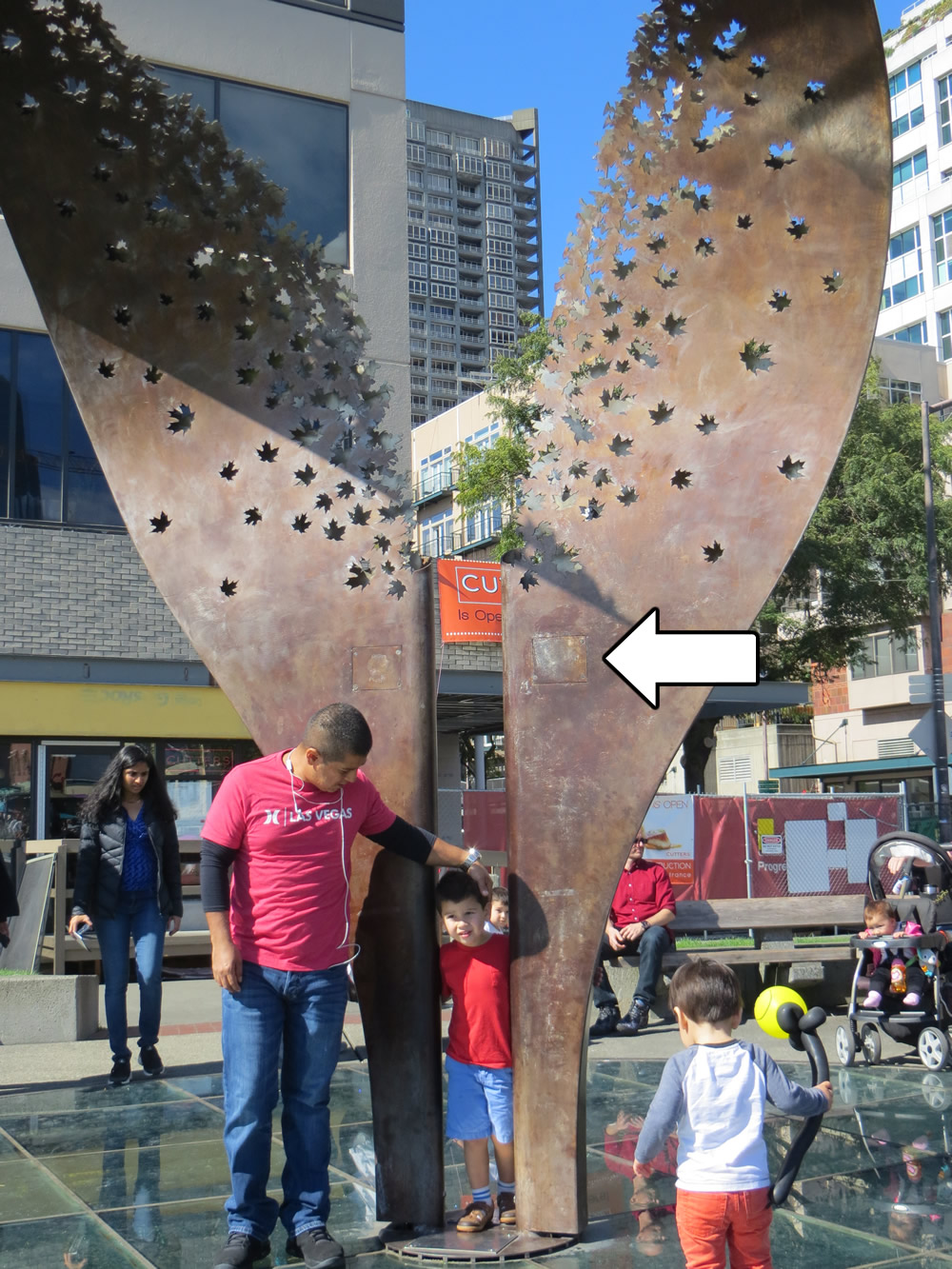
This sculpture in a Seattle park is part of the Tree of Life Wall commemorative project. SHARE says it paid $135K for this, but they won’t produce records. There’s nothing on or around the sculpture saying what it is. The arrow shows where plaques might have been. They have since been removed. [Photo by David Preston – Click to enlarge]
Tree of Life Wall: This is an art project in intended to commemorate homeless people who had died on Seattle’s streets. See more here. According to my research, large parts of the design and construction were covered by outside donations, and a SHARE insider confirmed that, telling me that SHARE contributed none of its own money to the project. SHARE claims on the 990 form that its one-year cost for the project was $134,931. Supposing the number to be true, again, we still have to wonder: Why is a homeless service group that claims to be running on a shoestring spending that kind of money on an art project? How many $7-a-bed bed nights would that money have bought? (Answer: 19,275)
The Embezzler’s Art
Embezzling is a form of theft as old as theft itself. What differentiates it from other kinds of stealing like strong-arm robbery or shoplifting is that it employs subterfuge and trust rather than force or audacity. It’s like a confidence game, only even more subtle. Unlike a con artist, who schmoozes the pigeon out of a wad of cash and then runs, an embezzler typically steals gradually, in smaller amounts, and over a longer time. He covers his tracks by juggling accounts and “cooking the books,” which he can do because he’s operating on the inside. If his victims should become suspicious, he can put them off by assuring them that this is accountant stuff that they wouldn’t understand.
Most embezzlement involves diverting an organization’s money to the embezzler’s personal use, and this requires a technique that I call cloaking. Cloaking is the practice of using an on-book account to create the impression that money is being used legitimately when it is in fact being staged for diversion. Let’s say the City of Seattle pays X Corp $100K to provide emergency winter shelters. X Corp could create an account on its books designated “Winter Shelter” and that account would be used to make it look like money was being paid to rent shelter space, hire staff, and so on. The money could be gradually diverted from that account via a dozen channels, and with a little effort it could all be made to look proper, at least to a casual observer. Having a trusted confederate on the outside would add a layer of cover to the scheme, because the confederate could attest that the shelter space was indeed provided and paid for. The confederate might even take payment and could then kick back money to X Corp, drawing it from still another cloaked account. In order to prove that this money wasn’t diverted, you’d need to examine both organizations’ books, and to do that, you’d have to make the case that both organizations are in on the scam.
If X Corp were effectively controlled by a very few people who were diverting money, it would not be technically correct to say that they were embezzling from X Corp, because, in effect, they ARE X Corp. But in any event, the cloaking mechanism is the same. And it’s still stealing.
Why should SHARE answer questions about these miscellaneous expenses?
–Because they’re suspicious.
Forensic accounting is a process in which investigators pick apart and analyze financial statements to determine where criminal activity might have occurred. Among the first things that forensic accountants look for on a subject’s books are unusual or unexpected items or numbers that seem unusually large for the items claimed. If a small, family-run olive oil importer took out a life insurance policy on a competitor, for example, that might raise some eyebrows. If it bought a policy for $20 million, that would raise them to the sky. For a homeless service provider like SHARE, a group that claims to be underfunded, a $135K art purchases suggests that the money is being diverted to other purposes and this is a way to balance the books. If SHARE wants to challenge my conclusions, let them show their books.
Item: SHARE claims to have internal reviewers but won’t let you talk to them.
On page 3 of my query letter, I refer to SHARE’s 990 Schedule O. Here SHARE claims that before it files a Form 990, its board members “spend considerable time reviewing it, comparing to prior years, etc.” I asked Ms. Marchand if I could meet with some of these board members to verify the truth of this claim. And of course, she did not respond. Frankly this did not surprise me. And when you meet some of SHARE’s board members, you’ll see why. These are not the type of folks you’d expect to see poring over tax returns, pecking away at calculators to make sure every jot and tittle adds up.
Meet SHARE board member Lantz Rowland . . .
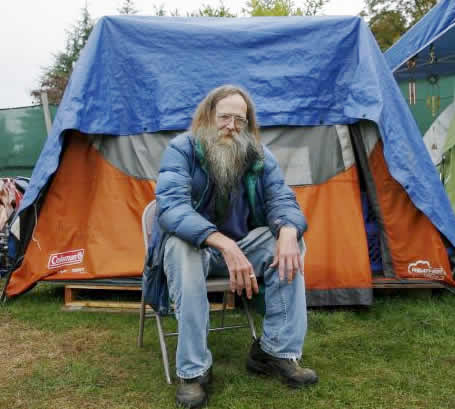
This photo is from an article in a December 2015 issue of the Irish Times newspaper. In that piece, Mr. Rowland claims to be homeless, and he certainly looks it. That’s not a crime, certainly, but it does raise the question of why a person living in a tent would be in charge of reviewing financial documents for an organization with an annual cash flow of nearly a million dollars. Mr. Rowland is still on the SHARE board and is listed as treasurer on recent grant application documents.
Meet SHARE board member Anitra Freeman . . .

I’ve met Ms. Freeman, and she’s a nice lady. I believe she cares for homeless people. But I don’t picture her “spending considerable time” reviewing SHARE’s 990 forms. If she had, perhaps she would’ve caught some of the errors I caught in just a few minutes.
Ms. Freeman’s signature is on SHARE’s 2012 990 form, along with Mr. Isaacson’s. She has posted comments on Facebook and elsewhere echoing SHARE’s 990 statement that the books are open and the public can come and look at them any time. However, I’ve tried to contact Ms. Freeman directly several times over the years, and she has never responded. Obviously, she didn’t really mean it when it she invited the public to drop in and go over SHARE’s financials. I also suspect that she’s lying on several particulars of the 990. Or that she’s just to muddled to know what’s going on.
And then there’s SHARE board member Andre Maurice “Andy” Abad . . .
Below we see his booking photo from a recent (June 2016) obstruction arrest in Minnesota. This was not Mr. Abad’s first run-in with police. In early 2014, he was arrested and charged with drug distribution at one of SHARE’s homeless camps in Sammamish, Washington, where he also appears to have been in a position of authority.
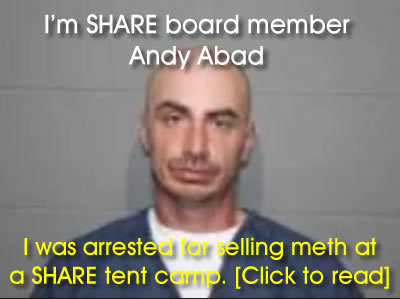 Does Mr. Abad seem like the type who could be (or should be) reviewing the financial records of a large non-profit organization? In truth, I doubt that Mr. Abad ever did review SHARE’s 990s, even if he was nominally on SHARE’s board of directors. It seems certain that Mr. Abad, like Ms. Freeman, Mr. Rowland, and perhaps even the bogus accountant Isaacson, was never consulted about the correctness or completeness of SHARE’s tax returns, and that he never got anywhere near SHARE’s real books. Like the others, Mr. Abad was simply a patsy, someone who could be easily manipulated by the only SHARE board member who mattered: Scott Morrow.
Does Mr. Abad seem like the type who could be (or should be) reviewing the financial records of a large non-profit organization? In truth, I doubt that Mr. Abad ever did review SHARE’s 990s, even if he was nominally on SHARE’s board of directors. It seems certain that Mr. Abad, like Ms. Freeman, Mr. Rowland, and perhaps even the bogus accountant Isaacson, was never consulted about the correctness or completeness of SHARE’s tax returns, and that he never got anywhere near SHARE’s real books. Like the others, Mr. Abad was simply a patsy, someone who could be easily manipulated by the only SHARE board member who mattered: Scott Morrow.
Why should SHARE allow the public to meet with its board of directors?
–So we can check the truth of SHARE’s claim that its tax returns and finances are subject to an internal review and so we can determine whether the board of directors has any say in the organization. And also because they promised.
Winter Shelter Contracts
I moved on from the 990 form to ask Ms. Marchand about contracts SHARE made with the city to provide temporary shelter for people during the winter. In addition to their regular shelter contracts, for several years, SHARE has been contracting with Seattle’s Human Services Department (HSD) to provide winter and emergency shelter beds for homeless people trying to get in out the cold. According to the HSD-SHARE contract for 2011-2012, SHARE was eligible to receive up to $559,439 dollars to pay for winter and severe weather shelter. The city’s payment scheme is complex, but the thing to understand is that SHARE is supposed to rent space at the Frye Apartments in downtown Seattle. The Frye is owned by one of SHARE’s confederate groups known as the Low Income Housing Institute (or LIHI). The relevant Project Services Agreement (contract) document that covers this is here:
Project_Services_Amendment_4_extract
There was some confusion about where the 2011-2012 winter shelter was supposed to be and where it actually was – if indeed it was anywhere at all. Sometime in the winter of 2011-2012, a housewife from Kirkland, Washington named Janice Richardson was trying to find emergency shelter for a homeless woman she’d befriended named Becca, who was fleeing a domestic violence situation. On a Friday afternoon, Richardson called King County’s emergency assistance 2-1-1 number and was told that SHARE was running an emergency winter shelter at the Frye Apartments in downtown Seattle. Richardson took Becca to the Frye and the women were told by a staffer that there was in fact no winter shelter there. The following Monday, Richardson called SHARE’s Michelle Marchand who, according to Richardson, began badgering her about why she wanted the information and ended up giving her the blow-off. The dauntless Richardson then followed up with Ms. Lynne Behar, CFO at LIHI, the group that owned the Frye. Behar told Richardson that while LIHI had operated winter shelters at the Frye in the past, they weren’t doing it that year. At this point, Richardson called the Human Services Department, which she’d learned was funding the winter shelter program, and was directed to a David Takami. Takami took her information and said he’d get back to her. He never did.
Sometime after that (but before I’d met Ms. Richardson and heard her story) I too contacted Ms. Behar, specifically to ask her about her group’s relationship to Scott Morrow. Behar was cordial and told me she’d never heard of Mr. Morrow until just recently, when complaints about him were being reported in the local press. I asked Ms. Behar to show me some financials for LIHI, and she sent me a nicely done annual report summarizing LIHI’s holdings and activities for the previous year. A few weeks later, I sent her an e-mail asking for records on the Frye’s use as a winter shelter. She didn’t respond. A follow-up request was similarly ignored.

The Frye Apartments in downtown Seattle. Seattle’s Human Services Department paid SHARE to rent space here for “winter shelter” in 2011-2012, but Ms. Richardson was turned away and told there was no shelter operating there. Photo: David Preston
Why is it important for SHARE and LIHI to demonstrate that the winter shelter was actually provided?
–Because it’s a lot of money and there are legitimate questions about it. The biggest problem with the winter shelter contract is on the HSD side. The contract says what the money will go for in a general way, but it doesn’t stipulate how it has to be accounted for, beyond just “agency reports” (where SHARE is the agency). What is supposed to be in those reports? A log of average nightly temperatures? Copies of news releases? Number of people served each night? Rental receipts? All we have to go on here is “agency reports” – which is another way of HSD saying they’re going to take SHARE’s word that they delivered the services when and where they said they would. Were any such reports ever even filed with the city? None have ever turned up, even though my colleagues and I have asked SHARE, LIHI, and HSD for this information repeatedly.

While SHARE is subject to a periodic “fiscal review” by city staff, all such reviews to date have been cursory. The man charged with doing these reviews, Efren Agmata, is not a CPA himself, nor is anyone in his chain of command. Agamata seems to be a trusting soul. In all the years he was reviewing SHARE’s financials, it never occurred to him to check into the fraudster Isaacson’s CPA credentials. When a colleague of mine asked a spokesperson for HSD why Agmata wasn’t more curious, she was told that HSD trusts people to be who they say they are.
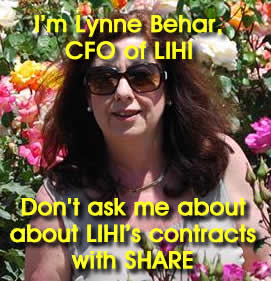 It’s a fair inference that SHARE diverted and stole at least some of the winter shelter money, using the HSD contract as a means to cloak that. They might have cooperated with LIHI on this as well. A minimally competent review of the financial records by HSD would have sniffed this out. But no such review happened.
It’s a fair inference that SHARE diverted and stole at least some of the winter shelter money, using the HSD contract as a means to cloak that. They might have cooperated with LIHI on this as well. A minimally competent review of the financial records by HSD would have sniffed this out. But no such review happened.
The SHARE-LIHI Connection
I often speak of SHARE and LIHI together, as if they were the same entity. In an important sense, they are. LIHI was co-founded in 1991 by Scott Morrow, who now runs SHARE. Although Morrow nominally left SHARE some time in the 1990s, in practical terms he hasn’t left at all. LIHI’s current executive director, Sharon Lee, was hired on while Morrow was still running the ship, and within a few years she was already in a leadership position, where she has stayed ever since. Lee is a high-profile executive. Her salary is in the high $170s and she runs an outfit with upwards of $50 million in assets and $5 million in yearly income. LIHI controls a handful of marquee properties around downtown and is buying up more land all the time. Lee also has a huge influence on homeless policy; when the Mayor put a $250 million housing levy on the ballot this spring, she took pride of place by his side.
Yet something is wrong with this picture, because if you follow Lee’s career closely, you’ll see this connection with Mr. Morrow cropping repeatedly: Morrow needs to make a deal with the City for “emergency winter shelter”? –Lee’s right there with space at one of her buildings. Morrow wants to open a new homeless camp in some neighborhood? –There’s Lee again, telling the City she’ll underwrite it. Morrow needs to show he’s got social workers coming to Nickelsville so the property owner can get a tax break from the state? –Lee saves the day again, with promises to send case managers out there weekly. Morrow needs to have camp Dearborn evicted after the campers vote him out? –Lee again, with a letter to the mayor and city council, saying the camp is “unsafe.” –Does SHARE need to get its point across at a public forum about homelessness? –Lee’s right there at the podium, reading from Morrow’s notes.
Morrow’s almost never in the spotlight himself. It’s always Lee standing up for the cameras. Making speeches and promises. While Morrow stands in the back of the room, stroking his beard. Morrow’s friends claims that he has no influence over LIHI, even though Sharon Lee follows him around like a puppy. Morrow also claims that he has no official position at SHARE. That he’s just an “unpaid consultant.
Time for a Closer Look
Has anyone asked the City to audit SHARE?
I have. In dozens of e-mails and phone calls to city councilmembers, HSD, and the Seattle City Attorney’s Office. I have documented my concerns about SHARE, not just about their finances, but about their harsh treatment of the vulnerable people under their care. Others have raised these issues over the years as well. No success.
Why doesn’t Seattle investigate SHARE and LIHI?
–The answer is: politics. Specifically, homeless politics. SHARE and LIHI are well connected to local politicians and each other. HSD isn’t free to audit these outfits just because it’s the right thing to do. Even City Attorney Pete Holmes, who holds an elected position, isn’t free to act on his own; he depends on the good graces of the mayor and city council who control his resources and his access to people in city government. Mayor Murray’s support for LIHI is locked in, and no fewer than five Seattle councilmembers have direct personal or political ties to Morrow or Lee, or both. These councilmembers are: Lisa Herbold, Kshama Sawant, Bruce Harrell, Sally Bagshaw, and Mike O’Brien.
Let’s put each of them into sharper focus.
Lisa Herbold
Councilmember Lisa Herbold is a former business associate of Morrow’s. Several years ago, Herbold admitted to me, after first denying it, that her acquaintance with Morrow went back at least as far as the ’80s, when the two worked together at the Washington State Tenant’s Union. Herbold later became Nick Licata’s aide, and since Licata had the housing portfolio on the council, Herbold became the go-to gal for homeless issues. One of her tasks was to troubleshoot public complaints against SHARE, which she did via back-door discussions with Mr. Morrow, and usually not to the advantage of the complainant. A woman who was evicted from one of Morrow’s tent camps after refusing to go to a protest told me that after she contacted Herbold, and Herbold contact Morrow, her situation at the camp actually deteriorated. When Herbold asked if there was anything else she could do, the complainant said no and broke off the discussions. She told me she felt betrayed. (This woman later filed a complaint with the Seattle Office for Civil Rights (SOCR), but SOCR dismissed it, claiming that they had no jurisdiction.)
Herbold has also been active in supporting Morrow’s Nickelsville project. Below we see a meeting of Scott Morrow, Lisa Herbold, Nick Licata, and two other SHARE staffers. This picture was taken at City Hall several years ago, when Herbold was Licata’s aide.
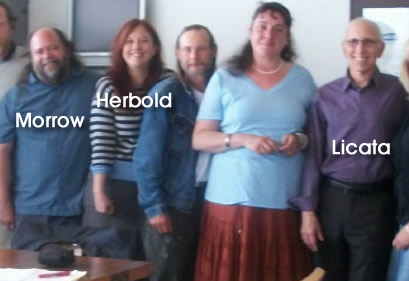
Kshama Sawant
SHARE and LIHI have both done favors for councilmember Kshama Sawant. And have gotten favors in return. A SHARE crew did signature-gathering for Sawant when she was working to get on the ballot the first time. After getting elected, Sawant naturally continued leaning on Morrow and Lee to turn out the crowds. And they leaned on her for city patronage. Which they got. Here’s a photo of Lee and Morrow conferring before Lee took the podium at Sawant’s 2015 “People’s Budget” meeting:

Sharon Lee and Scott Morrow confer before Lee speaks at Kshama Sawant’s “People’s Budget” meeting. The man in the foreground is a SHARE shelter resident earning “participation credits.” [Photo by David Preston]
Participation Credits
SHARE shelter residents get “participation credits” for attending political demonstrations and rallies. Each resident must earn a number of these credits each week. Otherwise, they face immediate eviction. Other options for earning the credits include doing trash pick-up, guard duty at camp, and other menial tasks. Compared to doing hours of trash pick up or standing sentry at 2 AM, sitting through a meeting at City Hall must look good. Using the participation credit system, Morrow can virtually guarantee a good turnout at rallies. Or protests.
Sawant has since become a national brand in politics, and Morrow is proud of his association with her. Last summer, after Sawant sent him an e-mail thanking him for his help with her rent-control initiative, he had copies made and distributed to his followers. The Adam referred to in the e-mail is Adam Ziemkowski, one of Sawant’s aides.
In her thank-you note to Morrow, Sawant refers favorably to the Nickelsville homeless camp, but I suspect that she never  visited there. When she wrote this e-mail, the camp was already in a state of advanced squalor, and a few months later Morrow had been evicted by campers who claimed that he’d abandoned the camp to his cronies. Morrow’s political allies (including Sharon Lee) then wrote an open letter to the mayor and city council, claiming that since the coup Nickelsville had become infested with drug dealers and violent criminals and should therefore be closed, which it was. Ms. Sawant never weighed in publicly on the power struggle or the condition of the camp. I don’t know if she’s continued her association with Morrow or Lee. She doesn’t respond to my inquiries.
visited there. When she wrote this e-mail, the camp was already in a state of advanced squalor, and a few months later Morrow had been evicted by campers who claimed that he’d abandoned the camp to his cronies. Morrow’s political allies (including Sharon Lee) then wrote an open letter to the mayor and city council, claiming that since the coup Nickelsville had become infested with drug dealers and violent criminals and should therefore be closed, which it was. Ms. Sawant never weighed in publicly on the power struggle or the condition of the camp. I don’t know if she’s continued her association with Morrow or Lee. She doesn’t respond to my inquiries.
Sally Bagshaw
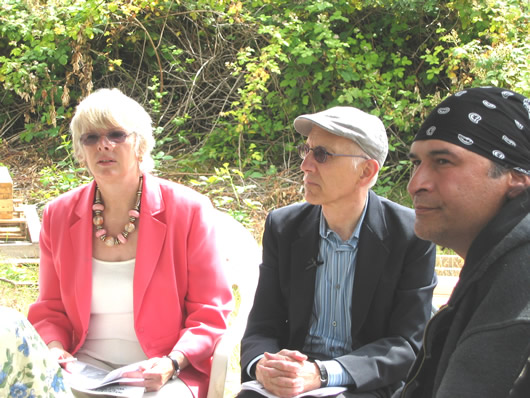
Sally Bagshaw (left) and Nick Licata (center) address the public at Nickelsville in 2011. Photo by David Preston
When Morrow’s Nickelsville crew squatted on some city land in West Seattle, councilmember Bagshaw embraced the project immediately, visiting the camp with Licata and three other councilmembers, smiling for the cameras, asking people support the camp with money. (In gratitude, campers named one of their pet goats after her.)
Nickelsville was later evicted from that site after being there for two and a half years and costing the county tens of thousands of dollars in health department remediation, but Bagshaw never apologized to the public or flagged in her support of Nickelsville, or the people behind it. She later went to bat separately for LIHI, arguing that Seattle needed to pay LIHI to run a series of “safe parking lots” for people living out of their campers. (See story here.) The city did fund one such safe lot but backed out of the deal quickly when it was discovered that the safe lots was costing tens of thousands of dollars per year, per camper.
Bruce Harrell
 Councilmember Bruce Harrell stood up for SHARE and LIHI in a big way when he led the effort to place one of SHARE’s camps in the Othello neighborhood in the spring of 2016. At a neighborhood meeting to discuss the issue, Harrell told the crowd that he’d listen to their concerns, but there wasn’t going to be any vote, because the camp was a done deal. And indeed, the camp was formally opened just two days after the neighborhood meeting.
Councilmember Bruce Harrell stood up for SHARE and LIHI in a big way when he led the effort to place one of SHARE’s camps in the Othello neighborhood in the spring of 2016. At a neighborhood meeting to discuss the issue, Harrell told the crowd that he’d listen to their concerns, but there wasn’t going to be any vote, because the camp was a done deal. And indeed, the camp was formally opened just two days after the neighborhood meeting.
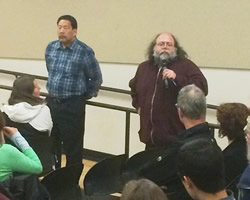
‘Othello Village’: CM Harrell stands at attention as SHARE’s Scott Morrow fields a neighbor’s question about the new camp on the block. Photo: Pete Mahowald
Mike O’Brien
Councilmember Mike O’Brien has done his time on the SHARE circuit as well. Below we see him at a 2015 public meeting, getting ready to explain to his Ballard constituents why they should support a SHARE/LIHI-run tent city there. (O’Brien is seated.)
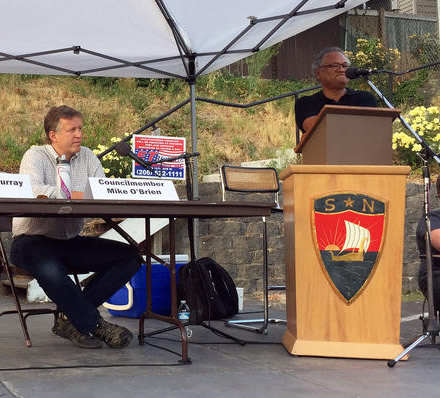
CM Mike O’Brien waiting to tell Ballard residents why they have to host a SHARE tent camp. Photo: KUOW
This picture is from a news story by KUOW, the local public radio outlet. The story’s title is “Protesting a Tent City and Mourning a Tree” –which insinuates that the protesters’ priorities are all mixed up because they think more of a tree than they do of their homeless humans. This is typical of the scorn directed by local media at citizens who question SHARE’s operation. (Don’t like tent cities? You must hate homeless people then. NIMBY! Why don’t you go hug a tree?)
I have asked each of the councilmembers above to create a meaningful, city-run appeals process for homeless campers who are evicted or otherwise disciplined by SHARE management. O’Brien’s  staffer told me that, despite complaints against SHARE’s handling of evictions, he feels that SHARE does a good job of protecting campers’ rights. O’Brien has also refused to use his connections with Ms. Lee to compel her to answer questions about her handling of the Nickelsville-Dearborn affair. And he’s one of the more responsive councilmembers. Ms. Bagshaw doesn’t even bother to answer.
staffer told me that, despite complaints against SHARE’s handling of evictions, he feels that SHARE does a good job of protecting campers’ rights. O’Brien has also refused to use his connections with Ms. Lee to compel her to answer questions about her handling of the Nickelsville-Dearborn affair. And he’s one of the more responsive councilmembers. Ms. Bagshaw doesn’t even bother to answer.
Seattle thinks of itself as an enlightened place. Most Seattle-ites want to help the homeless, but few of them know anything about SHARE. All they see are politicians up there on stage, talking about doing the right thing and making everyone feel good. It’s possible that some councilmembers don’t want to support SHARE and Morrow but feel they have no choice; they can’t afford to get tagged as homeless haters, and that’s just what could happen if they don’t pitch Morrow’s camps to the neighborhoods. No one knows what part of the Council’s support for SHARE is heartfelt support and what part is fear, but for SHARE’s purposes, it doesn’t matter. They’ve got a majority on the Council, and that’s what counts.
Other SHARE Connections
LIHI’s Sharon Lee, is a contributor to local political campaigns, and she is registered as a lobbyist with the City of Seattle, too. Her lobbying efforts seem to have paid off. Below we see her standing behind Mayor Murray as he announces a $250 million dollar property tax housing levy for the August 2016 ballot. (That ballot measure was approved.) Since Ms. Lee’s outfit is one of the largest providers of low-income housing in Seattle, she and her organization can expect to see a large chunk of that $250 million. Some of the money will likely end up in Scott Morrow pockets as well, by virtue of Morrow’s agreements with Lee’s organization.
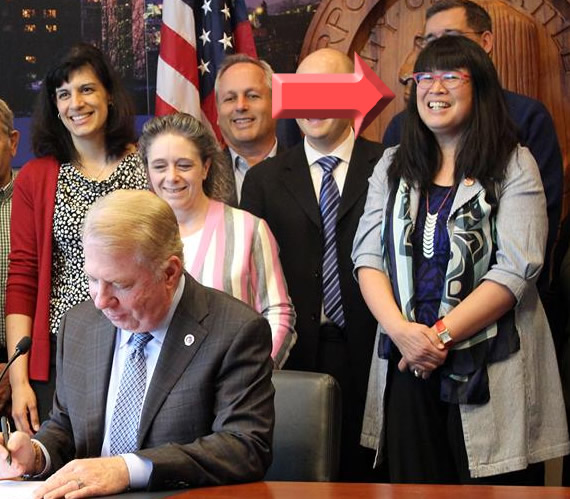
Sharon Lee beams as Mayor Ed Murray signs Prop 1 onto the October 2016 city ballot. The proposition, which passed, will raise property taxes and add $250 million to the city’s low-income housing budget. Photo: Seattle.gov
Ms. Lee likes to show her respect to politicians by naming buildings after them. So far, she’s got:
§ Gossett Place, named for King County Councilmember Larry Gossett
§ McDermott Place, named for long-time WA State Rep. Jim McDermott
§ Chopp Place, named for WA Speaker of the House Frank Chopp
–It so happens that all of these purse-string-holding politicians have doled out money to Lee’s organization over the years. We’re talking tens of millions of dollars. Over decades. Here’s a video of Sharon Lee with councilmember Gossett at the opening of the building she named in his honor. Also at the meeting are King County Executive Dow Constantine, Speaker Frank Chopp, and Seattle’s then-mayor Mike McGinn. Morrow is probably there, too. Off in a corner.
The Chopp Shop
Washington State Speaker of the House Frank Chopp is an old-fashioned padrone. Chopp controls the legislative and budget process through his power of committee appointments and his ability to punish legislators who displease him by keeping their bills from reaching the floor. Blood is messy, though, and Chopp prefers to schmooze when he can, rewarding his allies by blessing their bills and helping their pet projects get funded. Although he doesn’t have direct control of local political system, his influence is definitely felt there. Sources at the King County Council tell me that every year around budget time Chopp puts in an appearance there to make sure the councilmembers have their spending priorities straight. Though Chopp is a state politician, he represents a dense and politically active Seattle district, where he’s got a strong base within the non-profit community. Although he’s been in his government job a long time (26 years), he’s been in the non-profit business even longer. Chopp hired on as director of Solid Ground (formerly the Fremont Public Association) in 1983, and took it from a hippy-dippy neighborhood outfit to a nationally known and funded non-profit housing empire. As Solid Ground took off, Chopp decided to trade non-profit stardom there for the obscurity of Olympia. Today Chopp is merely the “senior consultant” at Solid Ground. He claims there’s no connection between what he does there and what he does in at the statehouse, but I have trouble believing that. Chopp has a big hand in allocating state money for social service programs, and millions of the dollars he sets aside in Olympia inevitably get planted right back in his Solid Ground organization. And also LIHI. (Surprisingly, this is not a violation of the state legislative ethics code. I’ll explain why in a subsequent post.)
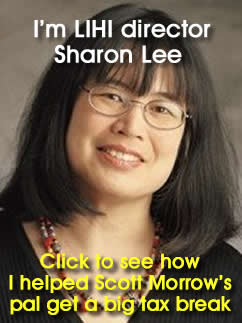 In 1991, Chopp co-founded LIHI together with a man named Michael Reichert (who became director of the non-profit housing whale Catholic Community Services) and a third man. The third man, interestingly enough, was Scott Morrow. (Someday, I’d like to ask Chopp and Reichert why they thought there needed to be a LHII, since Solid Ground and CCS already had plenty of housing units between them.) As for Morrow, his part in the triumvirate is the most curious of all. As we see from the SHARE Web site, Morrow isn’t interested in permanent housing; shelters and homeless camps are his thing. And yet, of the three co-founders, it’s been Morrow who has stayed closest to LIHI. And to its director, Sharon Lee.
In 1991, Chopp co-founded LIHI together with a man named Michael Reichert (who became director of the non-profit housing whale Catholic Community Services) and a third man. The third man, interestingly enough, was Scott Morrow. (Someday, I’d like to ask Chopp and Reichert why they thought there needed to be a LHII, since Solid Ground and CCS already had plenty of housing units between them.) As for Morrow, his part in the triumvirate is the most curious of all. As we see from the SHARE Web site, Morrow isn’t interested in permanent housing; shelters and homeless camps are his thing. And yet, of the three co-founders, it’s been Morrow who has stayed closest to LIHI. And to its director, Sharon Lee.
Morrow, Chopp, and Reichert all left LIHI soon after its founding. Yet they have each maintained connections between their respective organizations and LIHI. Solid Ground has partnered with LIHI to run various services like Urban Rest Stop. And LIHI has hooked up with CCS on housing projects around the state. Meanwhile, LIHI sponsors three “sanctioned” tent encampments on private and public land around Seattle, for which the city pays the groups several hundred thousand dollars annually. These camps are managed on a daily basis by Morrow and SHARE, but LIHI handles the finances. At least formally.
Frank Chopp doesn’t do public appearances with Morrow, but that hasn’t stopped him from putting in a good word now and then. In 2009, he kept the Port of Seattle from evicting a Morrow-run homeless camp on Port property. That was a coup for Morrow, because it showed that the heavy-hitter Chopp would put his reputation on the line for him. At that time, Mayor Greg Nickels had already chased Morrow and his followers off several city properties they had camped out at, and Morrow had named his camp “Nickelsville” in retaliation. This clever propaganda move, along with a series of SHARE-led protests at the homes of the Mayor and non-compliant members of City Council, contributed to Nickels’ defeat in the 2009 city election. Nickels is gone now. But Morrow and SHARE are still very much here. Thanks in part to the good offices of Mr. Chopp.
Chopp likes big government solutions to social problems. Especially when those solutions involve non-profit groups that he can steer money to, like LIHI and Solid Ground. Conversely, he doesn’t like private solutions. In early March, Chopp used his position at the statehouse to kill a popular bill that would have incentivized private housing developers to develop affordable housing. Chopp said that any bill to create more housing should be focused on nonprofit property owners. [Story here.]
Doesn’t the Human Services Department have a way to catch cheaters?
Yes, but . . .
On paper, HSD has a rigorous contract review process. Unfortunately, this safeguard is only as good as HSD’s determination to use it. The City’s Master Agency Services Agreement (MASA) requires service subcontractors getting $300,000 or more from the city to submit an annual audit done by a CPA. A sample copy of the MASA is here. The operative section is Section 340(2):
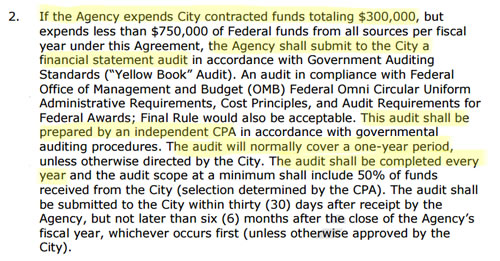
SHARE does get more than $300K per year from the city, and so they should submit audited financial statements to HSD every year. But they don’t. SHARE is typically a year late in submitting financials to the city, and such reports as they do submit are not audits but rather summaries. And for the last eight years at least, these summaries were not even reviewed by a CPA on the SHARE side. They were merely signed off on by a man who claimed to be a CPA.
 In June of 2013, HSD sat down with SHARE staff for review of documents. At that meeting were HSD’s “fiscal audit specialist” Efren Agmata, SHARE’s Michelle Marchand, Lantz Rowland, and two other SHARE staffers. The man who claimed to be SHARE’s accountant, Steven Isaacson, was not at that review. And neither was Mr. Morrow. What qualifies Mr. Agmata, a non-CPA, as an “audit specialist” is not clear. He is not himself a CPA, and when I asked about this I was told that there is no CPA anywhere in the SHARE chain of review. In any case, the review was completed, and on August 12, 2013, the boss at HSD, Catherine Lester, sent what looks to be a pro forma letter back to Marchand saying that HSD found SHARE’s books to be in order.
In June of 2013, HSD sat down with SHARE staff for review of documents. At that meeting were HSD’s “fiscal audit specialist” Efren Agmata, SHARE’s Michelle Marchand, Lantz Rowland, and two other SHARE staffers. The man who claimed to be SHARE’s accountant, Steven Isaacson, was not at that review. And neither was Mr. Morrow. What qualifies Mr. Agmata, a non-CPA, as an “audit specialist” is not clear. He is not himself a CPA, and when I asked about this I was told that there is no CPA anywhere in the SHARE chain of review. In any case, the review was completed, and on August 12, 2013, the boss at HSD, Catherine Lester, sent what looks to be a pro forma letter back to Marchand saying that HSD found SHARE’s books to be in order.
hsd_review_letter_august_12_2013
A colleague of mine, Karen Morris, has been gathering anything she can find on HSD oversight of SHARE. As a result of a public disclosure request, she became aware of another review done by HSD’s Agmata. This one was in November, 2015. In HSD’s internal correspondence on this, they refer to “audited financial statements” for 2013 and 2014 as part of their review process. “I first requested copies of those ‘audited financial statements’ in mid May, but I went back and forth for weeks with Seattle HSD public disclosure trying to get them,” Morris told me. She continued:
On July 14, I was finally told by HSD’s public information officer Chelsea Kellogg that the audited statements did not exist, and that the only reports available were the ‘financial statement reports,’ which I had already received. The cover letters on those make it clear that they are materially different than ‘audited financial statements’ because there is no attempt by HSD to verify the figures provided; they are just accepted at face value and then put into appropriate form. These reports were also represented as having been done by Mr. Isaacson, whose CPA license lapsed some 32 years ago. In that July PDR response from Seattle HSD I had been told that it was “common practice” to allow options for agencies when fulfilling financial reporting. The inescapable conclusion is that Seattle has set accountability measures on paper for these contracts, signed them, filed them and then failed to enforce them.
In the spring of 2016, the Blog Quixotic ran a story, later picked up by the Seattle Times, on how SHARE was using an unlicensed accountant to do their taxes and organize their financial paperwork for HSD. The man was signing his name with a “CPA” but he hadn’t been licensed since 1984. There is no record of this “accountant” advertising his services  anywhere or working for anyone besides SHARE, which raises the question of who had approached whom. If Isaacson didn’t have a shingle hung out, SHARE would have had to go looking for him. By their own admission, SHARE used Isaacson’s services for at least eight years, and this naturally calls into question all the Isaacson-prepared material, vague as it was, that SHARE had been submitting to HSD in all that time. HSD is aware of this situation, yet they have not called SHARE in for another review of the books.
anywhere or working for anyone besides SHARE, which raises the question of who had approached whom. If Isaacson didn’t have a shingle hung out, SHARE would have had to go looking for him. By their own admission, SHARE used Isaacson’s services for at least eight years, and this naturally calls into question all the Isaacson-prepared material, vague as it was, that SHARE had been submitting to HSD in all that time. HSD is aware of this situation, yet they have not called SHARE in for another review of the books.
Will anyone at the city investigate the SHARE-HSD contracts?
–Probably not. The next step up from HSD is the city attorney’s office, and things don’t look promising there. On June 13, in response to the bogus accountant story, City Attorney Pete Holmes sent a letter to SHARE’s Michelle Marchand telling her that the group needed to get themselves a real accountant and then have that person review and resubmit the paperwork sent in by the fake one:
holmes_letter_to_share_jun_13_2016_markup
In the letter, Holmes talks about the remedial steps SHARE has committed itself to. He’s referring to an open letter SHARE posted on its Web site on May 17 in response to my story. On that page, SHARE claimed that they’d been victimized by Isaacson and were taking “action” to resolve the situation. In his letter to Ms. Marchand, Holmes appears to take SHARE at its word. He reminds them that they need to make good on their promise to get a licensed CPA and adds that they need to resubmit financial reports for the years Isaacson was working for them.
This is clearly not the kind of enforcement/compliance letter one would expect to see from a government agency. A real enforcement letter would mention possible consequences for failing to comply with the agency’s directives, even if that step were a ways down the road. If a neighbor complains to the city about your dog barking, and the city sends you a letter, that letter will have some mention of possible penalties if you fail to keep your dog quiet. Holmes’ letter talks only about what he “believes” SHARE needs to do, not what he can make SHARE do. “I believe,” he says, at the end the of the letter, “it is the responsibility of the entire SHARE board to ensure that SHARE is brought into compliance with this agreement, and to ensure that properly credentialed CPA services have been retained.”
Mr. Holmes seems to think that folks like these are going to run out and hire a real CPA because that’s what he “believes” they need to do . . .

In early August, I sent Holmes an e-mail inquiring as to whether SHARE had gotten a CPA and resubmitted their reviews and, if not, whether there would be any follow-up from his office. I never heard back, but I can assume that the answer is no. On August 25, two and a half months after Holmes’ first letter, he sent another, this one even meeker than the first. It’s a one-pager written in the same supplicating tone. It includes no specifics on what will happen to SHARE if they simply don’t comply with the City Attorney’s directives:
holmes_follow-up_letter_to_share_aug_25_2016_markup
On September 6, I contacted Holmes’ office once more and asked him to tell me whether he was planning on imposing a deadline on SHARE to get an accountant, and what consequences would follow. One of his assistants, John Schochet wrote this back: “Hi David. [ . . . ] Specific plans for following up beyond the letter I sent you are a privileged matter our office will work on with our clients, so I can’t share any details about next steps at this point.” It’s not clear whom Mr. Schochet means by “clients.” Conceivably, the City Attorney could be treating either HSD or SHARE as clients here. He should be considering the taxpayers to be his clients as well. But he certainly doesn’t seem to be looking out for them.
It is now more than three months after the fake accountant story broke. The City Attorney has sent two letters to SHARE with no timeline and no threat of enforcement in either one. For your reference, here’s a picture of City Attorney Pete Holmes. It was taken in 2012, at a Seattle pro-marijuana-legalization rally known as “Hempfest” where Holmes was a featured speaker:

Source: Wikipedia

City Auditor David G. Jones is a reclusive figure. This is the only photo I could find of him. Source: Association of Local Government Auditors
This isn’t the first time the city has stonewalled me on SHARE. Back in August 2013, I asked Seattle City Auditor David G. Jones to look into SHARE’s relationship with the city based on their questionable tax returns. He said he couldn’t because there was an “ongoing criminal inquiry.” But there was no such inquiry. Or at least, none that would have City precluded Jones from acting on his own . . . if he had wanted to. Yes, there have been police inquiries into SHARE from time to time. FBI agents have approached Morrow’s associates or clients and asked them about goings on at the tent camps. That’s as far as it ever goes. There’s obviously never been a real investigation of SHARE, because even a minimally competent investigation would have discovered the fraudulent accountant and tax evasion well before I did. And that would have led to action. In any case, Mr. Jones never revisited the the matter with me. And, needless to say, he never audited the HSD-SHARE contracts either.
It is clear that nobody at City Hall is ever going to take any serious action on SHARE.
Are these people corrupt? Is there a conspiracy to protect SHARE?
–Incompetent, maybe. Corrupt? No. Probably not. If there is a conspiracy afoot, it is not to protect SHARE but to protect the city. After a decade of building up LIHI and alternately grooming and extorting politicians, SHARE has essentially captured Seattle. In this city, politicians and media figures aren’t bought off with cash or forced into line by death threats; they’re trained to their role, stroked into compliance with positive labels (“progressive,” “compassionate”) or caned into submission with negative ones (“homeless hater” “one percenter”). Subtly, insidiously, they are compromised. And once that happens, Scott Morrow can play them like his own orchestra. In this system, reporters cover for politicians, politicians cover for bureaucrats. And they all cover for SHARE.
Summary of Charges
By its own admission SHARE is not a provider of housing (or even services) to homeless people. What it is is a machine that churns up millions of dollars in public funding and private donations and channels much of that money into the pockets of a few people. SHARE depends on its relationship to the large, semi-legitimate housing provider LIHI, whose director it effectively controls, and on its extensive network of political extensions around the state. It also relies on the continued goodwill of a naive and disinterested public. SHARE’s crimes are difficult to expose and prosecute, because the same politicians who depend on its patronage (and who patronize it in return) are the ones in charge of the investigative machinery. Such people naturally won’t allow any investigation that might implicate them.
Specifically, I believe SHARE is engaged in the following:
§ Skimming (pilfering non-cash donations before they make it on the books)
§ Fraud (taking money from the city and not delivering the promised services)
§ Embezzlement (diverting on-book money into people’s pockets)
§ Tax evasion (substantially and deliberately misstating things on 990 forms)
LIHI should be investigated for fraud in relation to the SHARE-HSD winter shelter contracts and tax fraud regarding its involvement in securing a downtown property owner an undeserved property tax break. See the story here.
To the list of charges above I would add conspiracy, except that conspiracy is a notoriously hard charge to prove, one that has sunk many an otherwise solid criminal case. Did SHARE involve LIHI in a conspiracy to defraud Seattle on winter shelter? To prove that you’d need to show that SHARE never intended to provide the shelter and that LIHI knew exactly what was happening and went along anyway. To prove that, you’d need to place LIHI and SHARE staff in meetings where they agreed to defraud. Absent a wiretap or a disgruntled employee with a stack of incriminating documents, such evidence is not likely to be found.

SHARE’s Nickelsville homeless camp moved onto public land in West Seattle (illegally) in February of 2011 and left this mess after they were finally evicted in September of 2013. When the camp was new, Sally Bagshaw and other councilmembers held a press conference there, defending it as a valid response to homelessness. Bagshaw was not there to see the mess they left behind. And neither were the TV cameras. [Photo by David Preston]
We might also put obstruction of justice on the charge sheet, but for that to stick, you’d need to show that there was a serious investigation and that SHARE people were lying under oath. Such investigations as there were appear to have been run by clowns.
There’s a host of lesser things that don’t rise to the level of criminal matters but are merely unethical. Forcing homeless people to donate goods for the “Harvest Auction” is unethical, for example. It violates both the spirit and the letter of service agreements between the city and SHARE. It would be difficult to prove malfeasance on SHARE’s part, because public officials have known about the Harvest Auction for years and have taken no action on it. Nevertheless, the practice of compelling donations should be stopped immediately.
Conclusion: Time to Call in the Cavalry
If an audit is done on SHARE, and a comparison made between what SHARE reports on its tax forms and what it has on its books, and then that is compared with what SHARE actually provides for the money, the corrupt nature of the organization will become clear. But who in this town is going to push for something like that? No one. What’s clearly needed now is an intervention by the IRS and other federal agencies (HUD, FEMA) that have funded SHARE but whose bosses (presumably) don’t owe anything to politicians in this town. In the meantime, audits should be done by the state auditor’s office on any state or city contract involving SHARE or LIHI and SHARE jointly (to include SHARE’s child organization, Nickelsville.) The State Auditor’s office has already scolded HSD for doing a generally sloppy job in the auditing department; now they need to focus in on a few particularly troublesome contracts.
Criminal indictments should be brought against any individuals connected with SHARE who can be shown to have likely broken the law. In the meantime, SHARE should be put into receivership and its eligibility to contract with Seattle or King County for services revoked. While in receivership, none of SHARE’s operations should be farmed out to LIHI, Catholic Community Services, or Nickelsville.
–Story by David Preston
Many thanks to Janice Richardson and Karen Morris, who contributed research, material, and moral support.
Postscript
Below is a handy Organization Chart showing the basic chain-of-command structure.
Click the Graphic to Enlarge or Download
Note on the Food Chain graphic: As I’ve shown, there are several players in this game; seeing them all round the board together makes it easier to understand how the game is played. Space limitations kept me from putting everyone on there, so some folks are doing double duty. For instance, councilmember Sally Bagshaw is standing in for at least five current and former councilmembers who have actively helped SHARE/LIHI at one time or other, while the Jimmy Olsen reporter guy represents dozens of journalists who have run lazy or fawning stories involving SHARE. The Church Lady figure stands in for thousands of donors or volunteers. She could be anyone from a camp helper to a billion dollar philanthropy.
People who know only the gentle side of Frank Chopp might object to me characterizing him as a boss or question my implication that he’s calling the shots for Morrow. That Chopp is a boss – in the old fashioned, political sense of the term – is beyond question. But Morrow is a kingpin too, and their relationship is a complicated one. Chopp doesn’t give Morrow orders or concern himself with the daily goings on at SHARE (if anything, he considers Morrow a liability) but LIHI is a jewel in both men’s crowns and Chopp is clearly above Morrow in the food chain. So that’s why I put him where I did. The real slight to Chopp is not that I’ve put him in the same chain with Morrow but that I’ve left out all the other chains he’s part of. To give an honest picture of Chopp’s connections, I’d need a chart as high and wide the downtown seawall. I don’t think Chopp’s a bad guy, like Morrow. He’s probably good guy. He’s just got his big fat fingers in too many pies.
The figure in the upper left-hand corner (“TBA”) will be revealed in a subsequent article. This person relates to the food chain primarily through LIHI. But he’s really above everyone.
Why isn’t the media looking into SHARE?
The news media love homeless stories for the same reason the politicians do. Because it gives people the warm fuzzies. Homeless camp operators are perceived not as exploiters but as rescuers. Pictures of sad-eyed homeless kids sell stories, and stories sell advertising. By contrast, 10,000-word stories about tax forms and bureaucratic incompetence just bore people. Or even embarrass them. Thousands of Seattleites have given money or time to SHARE over the years. Do those folks want to read a story about how SHARE has been on the take all this time? No. They do not. (Just remember the Ken Schram experience.)
The media have something to consider besides just readers. They’ve got sources to worry about, too. I’ve passed information along to the Seattle Times before. I get nothing back. A few days later I’ll see them quoting a Sharon Lee on the tax levy or asking a character like Lantz Rowland how it feels to be homeless. I get it. If the Times runs a negative piece LIHI and don’t get any traction, they’ve used up a lot of goodwill for nothing. After that no one at LIHI will ever talk to them again. Not to mention LIHI’s friends. That can be a problem when you do a story on homelessness every other day.
And then, too, there’s editorial politics. The Seattle Times, like most traditional city papers, endorses politicians and ballot measures. While that increases their circulation it decreases their objectivity, and blunts their fangs when it comes to dogging politicians. Editors will claim the opinion section is sealed off from the rest of the paper, but I know better. Several months ago I ran a story on State Auditor Troy Kelley and how the Times endorsed him, even though there were public court records suggesting he was a crook. The Times endorsed him anyway, and after the election he was indicted on federal charges of theft and money laundering. When I asked the editors at the Times whether they’d read up on Kelley’s court records before endorsing him, they did not respond. No surprise there. Read my analysis of the Kelley coverage by clicking on the graphic:
Or consider the Stranger, a popular free “alternative” newsweekly. The Stranger has the resources to do a meaningful investigation of SHARE. Unfortunately, they’re even more compromised than the Times. They’ve got no love for Morrow, but they’re sweet on many of his friends at City Hall. Look at their front-page endorsement of Kshama Sawant. Now, given that Sawant and other “progressives” at City Hall are such an important part of the SHARE story, do you think that the Stranger is going to be able to tell that story in all its rich detail? Of course not.

I don’t think we even need to mention the TV news here, do we?
Do you like the Blog Quixotic? Do you like this story?
Please consider donating.



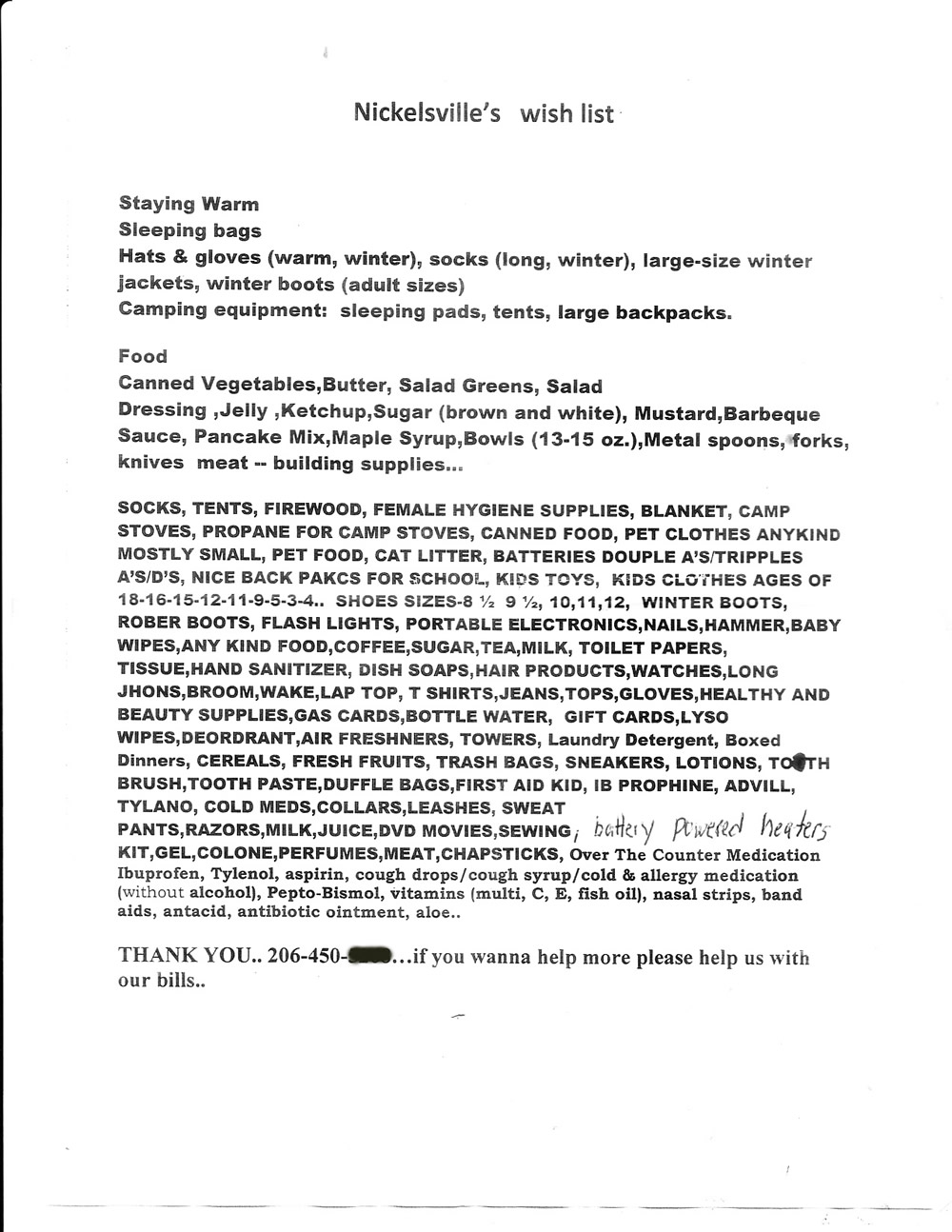
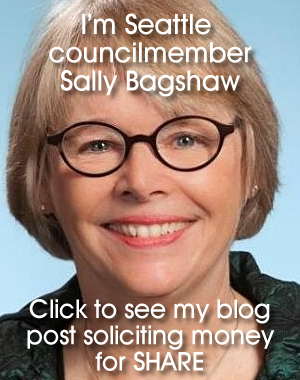
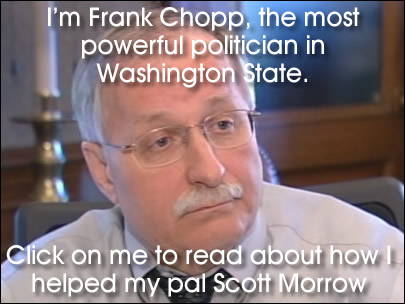



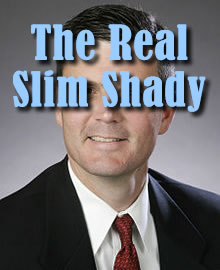


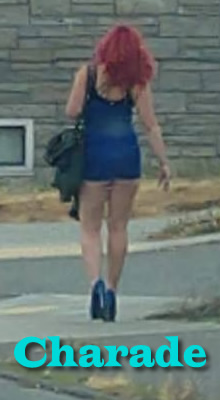
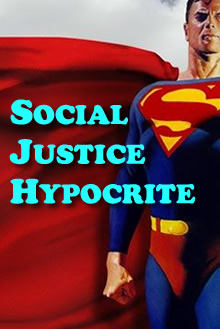

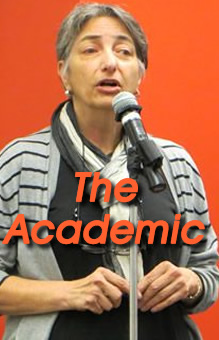





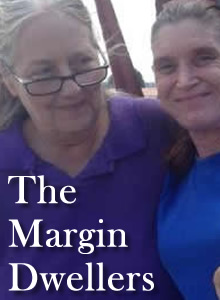







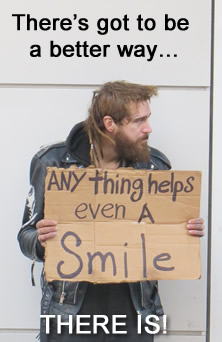
Thank you for your amazing coverage of SHARE and the related issues. Your blog reads a bit like a 60 Minutes report. Have you tried to get this to 60 Minutes? Seems like it would be of wide interest to others across the country dealing with the homeless issue.
Know anyone at 60 Minutes, Rick? LOL. Neither do I. As a rule, the media shuns me. Professional jealousy maybe? [wink]
Wow. Finally someone willing to state the obvious. If I produced tax returns such as those I’d be in jail. Amazing how no one seems to care. Mind boggling. Truly the Seattle Machine is well on its way to surpass Chicago. I applaud your research, diligence and ability to stay on point. Amazed that no one as usual is doing anything, as you certainly have done all the footwork. I wonder how much monies the Fed contributed to all their of these organization? At any rate I do know who I will not be voting for in future elections.
Why don’t the Republicans in WA. State start investigating & exposing the leftist/Democrat criminality that permeates the WA. political landscape? It is time for the Trump administration to start breaking down these leftist cabals, prosecuting these disgusting, lying, thieving, leftist criminals & forcing their brain dead, leftist followers to face the truth. Every city that is under Democrat control operates in this excact same fashion.
I agree with Carly, get this to the appropriate Trump people so this much needed’clean up’ can be initiated in his first 100 days. The headlines will be good for them and to ferret out the rats in this cabal. Money talks and the threat of restricting federal funds will get these rats scrambling .
I’m working as hard as I can on that issue, Carly. I have contacted some conservative local groups, and I thought I would get more traction with them. Nothing yet. It’s possible that I’m not ideological enough for those folks. For me, corruption is a non-partisan issue, not something that affects one side of the spectrum than the other. Here in Seattle, corruption is the province of liberals, but that is a function of the fact that liberals run this town. If I were somewhere in Kansas, I’d most likely be writing about corruption by Republican officials, because that state is more Republican.
A more appropriate move would be to provide this evidence, fraudulent claims and lack of financial accountability by Share and LIHI to the IRS for them to re assess these organizations 501 c(3) status. At least, they will have back taxes owed and more than likely have their exemption pulled to which the city will no longer be able to contract their services.
Dena Loveland,
I bet that spreadsheet you received did not include the taxes the city lost because the billionaire developers get tax rebates by providing a handful of subsidized apartments.
The city of Seattle’s property valuation has gone through the roof with all the new developments. Because of the Eyman initiative to limit tax growth, the existing, older homes should receive a smaller tax bill, but instead, the tax bills have increased.
the only way this could happen is if the new construction is not paying its fair share, which is probably done with those loopholes of subsidized units.
I don’t even know how to go about researching that, but I suspect it is in the tens of milions of dollars.
Mr. Preston,
I came upon this story (and others on your blog) via one of those unreconstructable, link-upon-link internet journeys that sometimes (too seldom nowdays!) leads one to such solid gold as I find here.
I am beyond impressed, heading into “in awe” territory, reading the result of your investigation. That this compares (very) favorably with the best-connected, most generously-resourced “big time” journalistic longreads I’ve encountered in the last 30 years. It is jaw-droppingly comprehensive, yet principled: more fair than the subjects deserve, some might say.
Perhaps other practicioners of 21st-century American journalism have set such a low bar that any excellence appears to fly far above it, and that’s a shame. I just hope that someday your reward will be much more than just the occasional sincere fan letter from casual readers. A corrective investigation and the appreciation of your fellow citizens, for starters, I guess. (Pulitzer Prize and some money would be good, too, eh?)
Anyway, thanks for adding to the all too short list of writers whose integrity of thought makes their view of reality valuable, to me, and, I wish, to everyone else. (The list has Pinker, Zappa, Sowell and Ed Abbey off the top of my head, so maybe I’m getting carried away here, but I *really* liked that SHARE article.)
Thanks, Trollificus! It’s great to get this kind of praise every once in a while.
All the Poverty Pimps are dirty crooks to the core. More food goes out the back doors of these non-profiteers to awaiting staff cars than out the front doors to hungry people.
Wow. Just wow. And the mayor is going to ask the people of Seattle for 275 million more dollars to spend on the homeless. What a scam. Surely someone in the media is willing to run with this story?
Thank Thank Thank you for all the time and effort with your investigation. I am in AWE of your dedication. This is an amazing and scary real world read. As a 4th generation Ballard gal and a 20 year Windermere agent, I have been very concerned about how and where our city headed. You have opened my eyes too some many things, I had NO idea were going on. It is amazing to me that there is no accountability, everyone is too scared to report or address your questions about what you have uncovered. I joined SOS in Feb and attended the 1st meeting last night. I hope to help this group bring your facts to the public. People of this city need to know what is going in behind the scenes. I hope to meet you in the future.
DAVID,
I FOUND THIS TO BE AN AMAZING AND INFORMATIVE PIECE. I AGREE WITH THE PREVIOUS GENTLEMAN AS YOU SHOULD TRY AND GET THIS TO 60 MINUTES AS I’M SURE THIS MUST ACCURE WITH OTHER CITIES AS WELL. BACK IN 2012 I WAS NOMINATED IN AS A BOOKKEEPER FOR NICKLESVILLE RIGHT BEFORE THEY BUMPED 175 FOLKS OFF THE BOTTOM OF BOEING HILL. THERE WASN’T MUCH TIME FOR “REAL” BOOKKEEPING, HOWEVER I WAS ABLE TO GET INVOLVED ATTENDING SHARE MEETING DOWNTOWN WITH PEGGY HOLT AND SCOTT MURROW. I LEARNED A FEW THINGS ABOUT WHAT WAS REALLY GOING ON THAT I WISH I HADNT. AND ITS GOT NOTHING TO DO WITH HELPING HOMELESS TRANSITION INTO NORMAL SOCIETY AGAIN AND EVERYTHING TO DO WITH GREED, POWER, PERSUATION, MANIPULATION, WHO’S THE PATSY THIS WEEK..YADA YADA. AND YOUR RIGHT, VERY MUCH SO FOR THAT MATTER, AS THE MAJORITY OF OUR CITIZENS HAVE NO IDEA JUST HOW CORRUPT THINGS HAVE GOTTEN. HAVE YOU HAD TIME TO LOOK INTO U.G.M (UNION GOSSPIL MISSION)? AND WHAT THERE ROLE WAS IN THE RAPID TRANSIT HOUSING PROGRAM IMMEDIATELY FOLLOWING NICKLESVILLE? JUST LIKE YOU MY FRIEND, I TRACT EVERY MOVE I COULD ABOUT THIS BECAUSE I WAS SMACK DAB IN THE MIDDLE OF IT AND I COULDNT BELIEVE THE AMOUNT OF MENTAL DAMAGE IT HAD DONE TO FOLKS AND HOW PEOPLE CIVIL RIGHTS WERE JUST COMPLETELY TRAMPLED OVER. BACK ON DECEMBER 14TH, 2016 I SPOKE AT TOWN HALL FOR A GIRL FRIEND OF MINE WHO HAD A PROJECT THAT SHE WAS GAINING AWARNESS FOR. IT WAS CALLED “EVERYTHING TO ME” REGARDING HOMELESS AND THEIR PETS. I THOUGHT THERE WOULD BE LOTS OF OTHER PEOPLE THERE THAT SHE HAD INTERVIEWED AS SHE MET MY DOG DEJA AND I AT THE “RV SAFE LOT IN BALLARD” (I GOT A STORY FOR YA THERE TOO). ANYWAY, IT WAS JUST ME AND MY DOG THAT SPOKE THAT NIGHT AND FOR REASON TOO AS I HAVE SEVERAL IDEAS THAT DEAMED WORTHY OF ATTENTION AND FOLKS IN THE AUDIENCE THAT WERE INVITED WERE FROM NON-PROFITS, START UPS, REAL-CHANGE, AND DEPARTMENTS WITHIN CITY PLANNING. TAKE A LISTEN @ https://soundcloud.com/townhallsea/everything-to-me-homeless-seattleites-their-pets AND MAYBE SOMETHING MIGHT STRIKE A CHORD TO MAKE A DIFFERENCE. LET ME KNOW HOW THINGS TURN OUT AND THANK YOU AGAIN FOR YOUR AMAZING RESEARCH! —PENNY LANE P. playingforchange4206@gmail.com
Shocking. Saddening. Infuriating. In that order. Would the Seattle Times re-print this?
We’re in the middle of a homeless crisis, and all of these agencies and politicians are turning to taxpayers for more money to feed the HIC (Homelessness Industrial Complex). Somebody needs to expose this to a wider audience.
Thanks for your question. No, the Seattle Times would not be interested in running this story or anything else written by me. They rely on several players in Homeless, Inc. to feed them info. When they do a story on housing, they will often tap LIHI’s Sharon Lee for a quote, and if they run any kind of expose on her, she will cut them off and will tell other providers to do the same. The Times has cut back on investigative staff and so they now depend on “inside sources” like Lee for a lot of their reporting. They can’t afford to alienate her. –David
This is such a great piece. I could spend all night reading your blog! I’ve long wondered about where SHARE’s money goes. I work for a church that provides shelter space for them and used to work for another. At one of them the space doesn’t have access to a bathroom, so SHARE pays for a Honey Bucket and that’s all. The church pays for the trash collection and electricity. The other church does provide them with access to a bathroom and also does not charge them for any utilities.
I appreciate your comments, Mary. I’m sorry to say that I’ve heard the like before. Many times. Keep reading and keep sharing with your friends. We’ll get this problem licked if we keep educating ourselves and keep putting pressure on the City to hold homeless service providers accountable. –David
This is fantastic journalism….This is orders of magnitude above the dumbed down slop that passes for journalism today….
You covered this this story and the players in this section of the story just supper…
But like most stories I see there is more to the story…
I don’t think its possible to have the all the blatant corruption go one for so long in the Homeless Industrial Complex with out it being allowed even encouraged by powers way above Frank Chopp….
I think this whole thing ties in quite nicely with Agenda 21….I am to lazy to go into this more so I will just leave it at this….
Also #1 As far as the money goes we are talking many 100s of millions.. Some of the top players in this whole thing must be doing quite well…And the porta potty companies seem to be doing quite well too..lol…..
Also #2 Seattle has had homeless sense the first day Seattle was a city and will always have homeless… The homeless never seemed much of problem or that numerous until all the cheap housing started to be torn down to build new housing/affordable housing…lol
Seattle for many decades had lots of cheap housing to house those with marginal incomes….Yes the influx of lots of new people are driving rents up but the city council is also passing many new laws that burden landlords and restricts cheap housing like the unnecessary rental registration and inspection law.They are doing their best to add fuel to the homeless fire..
So in some ways the homeless problem has been much encouraged…
T
Thanks for your comment, Bob. It means a lot to me to hear that. Consider subscribing. Thanks. –David
Not a balanced story at all. Incredibly one-sided, biased point of view.
David,
Where can I send you a check or help your cause in some way?
Known as online commentator dbcooper I have been trying to point out the total money grab the homeless “problem” has become. Not long ago there were a few well intentioned
volunteers and churches trying their best but now its dozens (hundreds) of con artists scamming the average taxpayer.
Have you submitted these documents to the IRS?
Also, did you actually go down to the SHARE office and request to see documents and records in person? Or did you only send a letter?
By the way, I didn’t have time to read the article in full detail, so I apologize in advance if my questions were answered somewhere.
Please send this article to Tucker Carlson. This is the journalistic equivalent of raw meat. I have never read a more comprehensive and thoroughly researched piece. Well done sir. Well done. Tucker would set this on fire.
I sent it to the Seattle Times’ homelessness team (I’m guessing the author has already contacted the ST…but maybe not). We’ll see if they follow up on it.